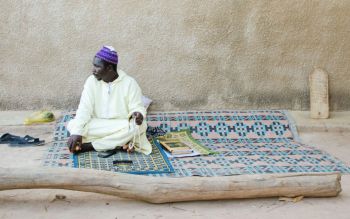Research news
As Sussex research programme ends, findings continue to influence policy on migration and poverty
By: Stephanie Allen
Last updated: Wednesday, 18 December 2019

After nearly a decade, the Migrating out of Poverty Research Programme (MOOP) is drawing to a close, having conducted research in more than ten countries in an effort to uncover how and why migration plays such a significant role in poverty reduction in some contexts, but not in others.
Funded by the UK’s Department for International Development, MOOP has built up a robust body of evidence on the relationship between migration and poverty, with research feeding directly into regional policy in the global South, and cited in international reports on development.
Coordinated out of the University of Sussex, the consortium has conducted research in five regions in the global South (South Asia; Southeast Asia; East, West, and Southern Africa) , incorporating 11 countries: Ghana, Senegal, Ethiopia, Kenya, South Africa, Zimbabwe, Bangladesh, India, Nepal, Singapore, and Indonesia.
Now, as the programme comes to a close, an end of programme report has been produced, detailing the significant impact it has had over the years.
Professor Priya Deshingkar, Principal Investigator of MOOP, University of Sussex, said: “Migrating out of Poverty was a multi country, multi-disciplinary and mixed methods programme of research, capacity building and policy uptake across Asia and Africa. It provided a unique opportunity to undertake comparative research on the kinds of migrations that matter to the poor and how the experiences of migration differ by gender, age, ethnicity and religion.
“Although migration does not necessarily lead to poverty reduction, it can be an important step in the social transformation of the lives of migrants and the families they leave behind, which explains continuing migration into many seemingly dead-end situations.
‘The research has helped to dispel some of the myths that surround migration, particularly in Africa.
“For example, discourses around human trafficking and debt-migration often portray poorer migrants as playing a passive role in setting their own migratory agenda, but we found migrants to be active participants in the decision-making process with clear goals for their future.
”MOOP research findings have directly fed into policy in Ghana, South Africa and Bangladesh and are influencing ongoing policy dialogue in Ethiopia, Senegal and Singapore.
“The Consortium leaves a strong legacy – MOOP trained staff have found positions in other research consortia, migration policy institutes and international PhD programmes.”
Since its origin, the programme has been committed to influencing policy and responding to policy priorities in the areas in which it has worked. This has taken many different forms in each region from playing a key role in the formulation of the National Migration Policy of Ghana and as well as the new National Action Plan to Combat Racism, Racial Discrimination, Xenophobia and Related Intolerance (NAP) in South Africa.
Key achievements of the consortium include:
-
Cutting edge research on the migration industry to better understand the social processes underlying irregular migration and human smuggling
-
Multi-sited, rigorous studies into low-paid occupations such as construction labour and domestic work. The research found common patterns cutting across cultural, political and economic contexts.
-
Focused research on gender and generational dynamics in communities with high rates of migration.
-
Programme data from bespoke migration survey was used in flagship reports by the United Nations Conference on Trade and Development (UNCTAD), and the Food and Agriculture Organization (FAO).
-
At a country level, a Media Network on Migration network was set up to change the debate on migration in Ghana from a largely negative discourse, to a recognition of the potential of migration.
Globally, the programme has also drawn on the enthusiasm and expertise of a diverse range of people at different stages of their careers who all have played key roles in producing and disseminating working papers, policy briefs, journal articles, comics, videos and infographics.
Allison Baldasare, Programme Manager, said: “As this was the first experience of my career working within the academic or research sector, I have come to very much admire the work and goals of my Migrating out of Poverty colleagues and our Department for International Development Research and Evidence colleagues. I will take forward into future roles the sense of inquiry and justice that I felt in working with these intelligent and sensitive people.”
Emmanual Quarshie, Communications and Research Uptake Officer at the Centre for Migration Studies in Ghana (2014-19), said: “Migrating out of Poverty has made me develop a keen interest in migration research. I am most proud of the opportunity I had to sit and dialogue with partners from other backgrounds in different countries without any form of discrimination and supremacy exerted. This meant a lot to me.”
As the programme draws to a close, those behind the research have been sharing further personal reflections on the Migrating out of Poverty blog.
The programme’s final report has been published online here and a full set of outputs are also available on the Migrating out of Poverty website.